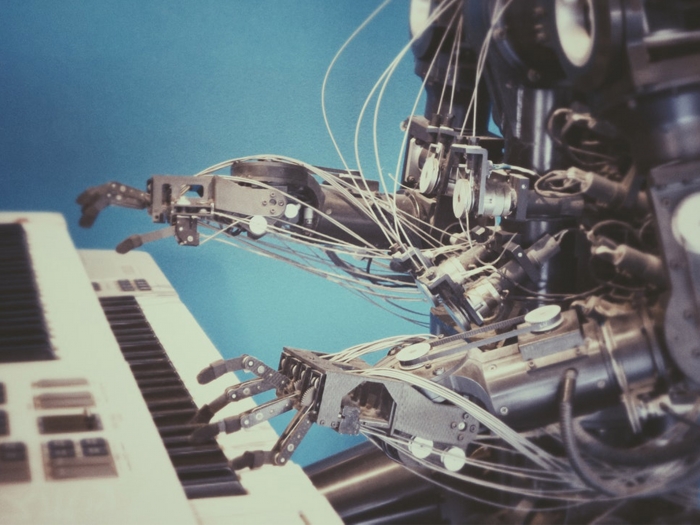Posted by Anthony Mooney
‘Go’ is an ancient abstract board game focused on strategic playing, invented in China and still played today. Lee Sedol was the world champion – until March 2016, when Google's Deepmind research team developed a deep neural network program called AlphaGo, which comprehensively beat him at the game. Although Sedol was shocked by his defeat, he conceded that AlphaGo would change his approach to the game from that point forward. This marked the dawning of a new era in artificial intelligence – and we’re beginning to recognise that it has the potential to be a catalyst for great change across swathes of human interaction.

Artifical intelligence (AI) – or more specifically, machine learning – is already impacting healthcare, education, defence, marketing and entertainment. As research continues to gather momentum, there’s little doubt that powerful algorithms will play an increasingly conspicuous role in our progress for many years to come. But with this level of potential comes great and grave concerns for our future, and – much like the dawning of the nuclear age or the information age – there will be a myriad of questions that need to be addressed before we comply fully with some of the outcomes that machines might have in store for us.
At IBM in 1952, Arthur Samuel developed a program that taught a computer how to win against a human in the game of draughts. The developments he made then still form the basis for much of the modern AI we see in action today.
Amazed as we may still be by the progress IBM made back then, there are some critical factors that help the machines of today to achieve the really impressive feats, like driving cars and diagnosing illness.
The first of these factors is processing power. Computers today are infinitely more powerful than the punch-card systems Samuel ran his experiments on in the 50s. The second – probably one of the most defining aspects of our generation – is data. Never before have we created, stored and accessed data at such a staggering rate. Twinned with the immense processing power, this data becomes the lifeblood of neural networks like Deepmind's AlphaGo. Lastly, the often-overlooked piece of the jigsaw is the team of human programmers that sets the parameters from which the machine will work. With access to infinite data along with unbridled connectivity, there’s a fear that malicious or uncontrollable AI could wreak havoc – perhaps causing a global catastrophe. But some experts feel that these anxieties are unfounded...
Dr Gary Marcus, Professor of Psychology and Neural Science at NYU
I think the biggest misconception around AI is that people think we’re close to it. We’re not anywhere near that. We’ve learned to engineer certain narrow problems like speech recognition very well. But the idea of having machines that can reason about the world in the ways that human beings can … I don’t think we’ve made any significant progress in that at all. Humans can be super flexible – they can learn something in one context and apply it in another. Machines can’t do that.
But there are valid concerns that, as the field of AI grows, its influence will reach the shores of nearly every aspect of our lives. The human biases that society fosters daily will influence the code, tarnishing the potential of these programmes to do good or to improve human lives. On the topics of gender, race and political persuasion, standards committees are already being called for to ensure equity across all aspects of the developing field. There’s already a sense that developments are occurring too rapidly for legislators to keep up. As we witnessed with Facebook and the 2016 US presidential campaign, these advancements are being put to use with dangerous proficiency, aiding those who seek to mislead the public and further their own personal agenda. So it seems that there are those who are staunchly opposed to AI and its would-be malicious intents, and those who believe it will redeem human civilisation, one day improving the lives of us all.
When discussing AI and Machine Learning, it’s common to think of the future and the impact it might have. In fact, AI is already working hard in places that we encounter regularly. Beyond the headline-grabbing developments, AI is making strides and affecting the running of businesses day to day. In marketing, Machine Learning is helping professionals to analyse data like never before. This analysis is leading to smarter customisation, segmentation and personalisation in e-commerce and advertising activities, which helps end users by offering smarter choices, and businesses by helping them to focus their resources and strategy.
Developments in visual search and online search engines are vastly improving the way we locate data – we’re given insight and suggestions where we may have been frustrated by the lack of results before. Predictive analytics is another area where AI is revolutionising business practices and the wider world. Helping us to foresee the future, predictive analytics is the practice of extracting information from data sets to predict oncoming trends. In the past, collated data would only help us to understand what had already happened, but powerful AI can use the same data to model the future and make accurate predictions. This has far-reaching potential to assist humans in almost every line of work and wellbeing. Healthcare agencies are already using technology like this to help doctors predict illnesses and prepare with greater efficacy than humans alone could ever achieve. The medical sector en masse is set to change hugely as AI promises to help health professionals with research, diagnoses and prevention. Imagine a health system where syncing a million global AI doctors with the latest treatment plans takes less than a minute, as opposed to now when investing time and resource in the continuous education of doctors takes months, if not years.
Although some critics think that AI will lead to mankind's economic obsolescence, it’s in areas where humans can work alongside AI that we’re likely to see the true benefits of advances like predictive analytics. Like healthcare, design is another sector where neural networks working in tandem with designers has already begun to help companies like Wix, Vox Media and The Grid to create unique offerings that combine content management with eye-catching aesthetic. Such advocacy provides these businesses with compelling solutions to the problems they face as a result of the immense amounts of data they create. Designers have many things to consider on any project. Working with advanced networks can reduce many of the tough decisions they’re required to make, allowing them the space to concentrate solely on the design. In the words of Paola Antonelli...
Paola Antonelli, Senior Curator of Architecture & Design and founding Director of Research & Development at the Museum of Modern Art (MoMA) in New York
I see AI as a tool. When designers master that tool, they can expand their ability. That is what happened with previous tools.
Humans have caused so much social change through industry, and technology has always been a driving force in that change. AI is set to become a tool, like a mouse or a steam engine, the full potential of which can only be realised in the clever and creative minds that adopt and use it.
Machine Learning and the various neural networks that it advocates are reaching into our lives, promising to change so much of what we’ve come to know. We see it in our Spotify playlists; the chatbots that enrage us; the search engines that we depend upon. We see it creating art and typefaces, propelling designers and helping doctors to make better diagnoses. Like all new technology, without regulation, it has the power to do great harm. But if fostered correctly, AI will be able to help us overcome some of the biggest issues of our time. As Alan Turing said,
Alan Turing
We can only see a short distance ahead, but we can see plenty there that needs to be done.
There’s certainly plenty for us to do and to address – but with the help of AI, along with neuroscience, there are no end to the possibilities of future human achievement.
If you liked this, you might enjoy our posts Four of our favourite alternate reality games and How to create an accessible website: part 1.

